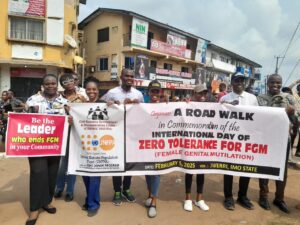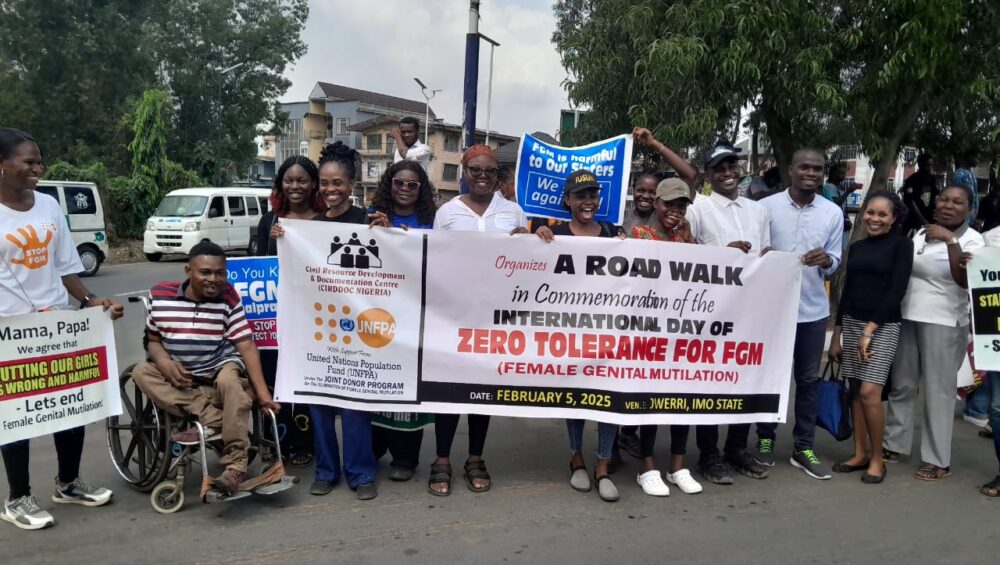By: Harriet Ijeomah
Over 500 people took to the streets of Owerri in a solidarity walk to mark the International Day of Zero Tolerance for Female Genital Mutilation (FGM), raising awareness on the dangers of the practice and advocating for its complete eradication.
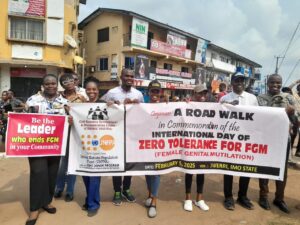
The event, organized by the Civil Resources Development and Documentation Centre (CIRDDOC NIGERIA) with support from the United Nations Population Fund (UNFPA), drew participation from civil society organizations, non-governmental organizations, persons with disability (PWD), students from various tertiary institutions, and representatives of ministries and agencies in the state.
The Founder of Honourbirth Foundation, Elizabeth Onyemaechi, a frontline activist against FGM, condemned the practice, describing it as a harmful traditional ritual that has caused immense suffering among women and young girls, especially in rural communities where it is still widely upheld. “This is a cultural practice deeply rooted in some communities, passed down through generations due to the mistaken belief that it is hereditary and necessary for a girl’s purity. However, there are absolutely no benefits attached to it. Instead, it leads to severe health complications, marital problems, and even death,” Onyemaechi stated.
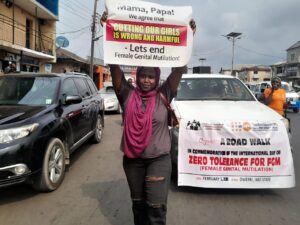
She recounted the harrowing experiences of FGM survivors, including a victim from Emeabiam Community in Imo State who has suffered from urinary and fecal incontinence for years. Another case involved a child whose genitals became severely swollen due to the procedure. Many circumcised married women also shared their pain, expressing a loss of sexual pleasure and deep emotional trauma caused by the act.
Legal experts, Faith Obisike at the event reaffirmed that FGM is a criminal offense under the Violence Against Persons Prohibition (VAPP) Law. Speaking on the legal ramifications, Barrister Faith emphasized that perpetrators of FGM face prosecution and up to five years in prison. “Female Genital Mutilation is a crime under Nigerian law. Anyone found guilty of carrying out or aiding this act will be held liable and punished accordingly,” she stated.
An Advocate also weighed in on the dangers of FGM. The Founder of Dorcas Foundation, Dorcas Samson Achi called on healthcare providers to become active advocates against the practice, both within hospital settings and in their communities. “FGM has no health benefits whatsoever; rather, it causes irreversible physical and psychological harm. It interferes with the natural functions of a woman’s body, leading to childbirth complications, infections, and long-term trauma,” she explained.
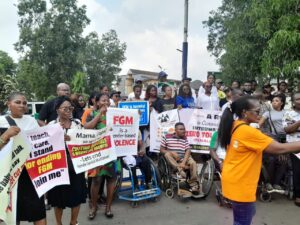
Statistics from the World Health Organization (WHO) show that at least 200 million women and girls worldwide have undergone FGM, with Nigeria among the countries with the highest prevalence rates. According to UNICEF, an estimated 19.9 million women and girls in Nigeria have been subjected to the practice, despite growing awareness campaigns and legal frameworks prohibiting it.
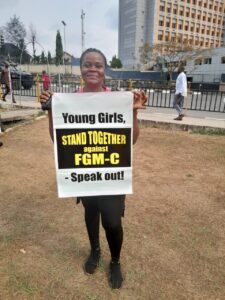
As the walk concluded, the Executive Director of Harsco Global, Harriet Ijeomah, called on the media to amplify the voices of activists and survivors. She urged international development organizations to support grassroots NGOs in carrying out more awareness programs, especially in communities where FGM is still widely practiced. “The fight against FGM requires a collective effort. The media must play a significant role in exposing these harmful traditions, while organizations and stakeholders must work together to put an end to this human rights violation,” she emphasized.
The commemoration served as a powerful reminder of the ongoing struggle to end FGM. With continued advocacy, legal enforcement, and community engagement, stakeholders believe that the eradication of FGM is possible, ensuring a safer future for girls and women in Nigeria and beyond.
